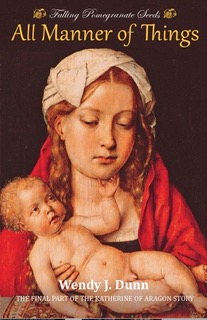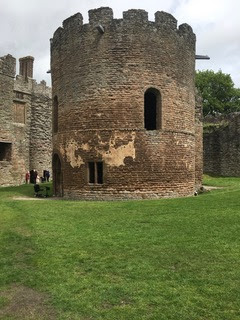Winter, 1539
María de Salinas is dying.
Too ill to travel, she writes a letter to her daughter Katherine, the young duchess of Suffolk. A letter telling of her life: a life intertwined with her friend and cousin Catalina of Aragon, the youngest child of Isabel of Castile. It is a letter to help her daughter understand the choices she has made in her life, beginning from the time she keeps her vow to Catalina to share her life of exile in England.
Friendship, betrayal, hatred, forgiveness – All Manner of Things tells a story of how love wins out in the end.
“A timeless story of friendship and love, which will stay with the reader long after the last page is turned, All Manner of Things is Wendy J. Dunn's best novel yet…”
Lauren Chater, author of The Lace Weavers and Gulliver’s Wife.
“To read this book is like tasting a succulent pomegranate that swells and ripens and reveals the luscious fruit…”
Glenice Whitting, author Pickle to a Pie and What Time is it There?
Mary Anne: A huge congratulations on your fabulous new release, Falling Pomegranate Seeds: All Manner of Things, Book #2. Could you tell us a little about your series and how you came to write it?
Wendy: Smile – it is a rather long story, Mary! The idea for Falling Pomegranate Seeds birthed when I was writing my first novel, Dear Heart, How Like This? This novel told the story of Anne Boleyn through the point of view of Sir Thomas Wyatt. Both Anne Boleyn and Thomas Wyatt knew Katherine of Aragon and were involved in various ways in her life – so deepening my understanding about her formed part of my research for this novel. After Dear Heart stepped out into the published world, I knew I wanted to write about her and started working on what I thought would end up as a trilogy about Katherine of Aragon.
Easier said than done.
The first version of the first book was knocked back by twelve publishers. By the time I received the last rejection I had realised I needed to rewrite the work in a different point of view. At that time, I was hurting too much about my failed novel to face rewriting it. It was a far easier decision to apply to do a creative PhD and start The Light in the Labyrinth, my second published work.
Ten years later (yikes – ten years!), I approached MadeGlobal about whether they would be interested in translating The Light in the Labyrinth into Spanish. Their answer was a quick no, but they also asked if I had any other works they may be interested in. It resulted in exchange of emails, and before I knew it, I was committed to rewriting Falling Pomegranate Seeds: The Duty of Daughters – the first book of my series. That novel was published in 2016, and committed me to completing my series.
I decided to take back my rights to my first two novels in 2018. When that turned out to be a very good decision, I took back the rights of Falling Pomegranate Seeds: The Duty of Daughters. Falling Pomegranate Seeds: All Manner of Things will be published under my own imprint too.
Mary Anne: Why do you think the Tudor period continues to fascinate?
Wendy: My theory is the Tudor Period taps into the sympathy of all things, that is, the collective unconsciousness. The Tudor period offers us so many stories which connect to archetypes and the hero’s journey. The Tudor period offers both readers and writers a feast of archetypes and heroes – especially in the time of Henry VIII. Katherine of Aragon is the older, long suffering wife who is replaced by a younger woman. Elizabeth Tudor tells the story of the rejected, unwanted daughter whose life follows the path of the true hero’s journey of victory. Henry VIII provides us with the cautionary tale of how power corrupts and destroys. The Tudor period unfurls a huge tapestry of the human experience: love, hate, lust, adultery, betrayal, murder, passion, ambition, tragedy and triumph.
The Tudor period also speaks to many women writers. In Tudor times, men dominated and dictated the lives (and deaths) of women. Women were the property of men, and silenced by men. That Tudor women achieved so much despite so many barriers put in their way inspires me to keep me writing their stories.
Mary Anne: What were the challenges you faced in researching this period of history and were there any unexpected surprises?
Wendy: My biggest challenge is that I am an Australian. That means, I live far away from the places I am writing about. It is very expensive to travel and stay in England – but I have managed it for all my novels. And I am glad I have done it. My research trips have opened my eyes to the fact that researching places of the past from books can result in mistakes. It has opened my eyes to fact that I am not good at reading architectural drawings, or maps. I once believed the Tower of London was close to Westminster Abbey. My walk from the Tower of London to the Abbey taught me otherwise. Yes – my friend and I made a lot of stops on the way, but it took us hours to reach the Abbey.
Last year, my visit to Ludlow Castle resulted in serious rewrites of my chapter about Catalina’s time there. Once again, I failed to understand the architectural drawings. From studying photos, I assumed the rotunda St Mary Magdalene Chapel was not connected to the castle. Not true. In Tudor times, the chapel was joined to the castle. I only discovered this by going to Ludlow Castle.
I also found myself surprised about Katherine of Aragon, the queen. I started this series thinking she was major influence on the early years of the reign of Henry VIII, but by the end of the series I realised the depth and breadth of this influence. Katherine was an excellent queen all through those early years. Erasmus claimed she was ‘a miracle of female learning’ (MacKendrick 1974, p. 6). In fact, he spoke more highly of her intelligence than he ever did of her husband, Henry VIII (Mattingly 1942, p. 138). She was patron to many at the Tudor court, and also extended her patronage to England’s universities. Her desire to provide her daughter Mary with a well-planned Renaissance humanist education could be said to have made it easier and more common for other noble girls to receive a similar education. This education model was well in place by the time Elizabeth Tudor was ready for schooling. So, one can argue that Elizabeth very much benefited from the life and influence of Katherine of Aragon.
Mary Anne: What do you think is the most challenging aspect of writing Historical Fiction?
Wendy: Finding the story – the beating heart of what is and always will be a fictional work informed by history. In my first drafts, I always know the historical personages I want to give voice to – but I do not know the story’s heart until I complete the first draft. Of course, the ethics of giving voice to the dead is also another challenge to surmount. Where my imagination takes me often leaves me uneasy. The only way I can move forward with integrity is by research – and knowing my imagination has been fed by this research. By engaging with thorough research and also not writing anything I cannot believe possible (thanks to research), is my way of showing respect to the dead.
Mary Anne: What advice do you have for aspiring Historical Fiction authors?
Wendy: Write what you are passionate about, enjoy the journey of research but try not to get lost into too many rabbit holes when you have a novel to finish. Also, remember rejection is part and parcel of being a published author, and is necessary if you desire to discover true ‘perseverance furthers’.
MacKendrick, M 1974, Woman and society in the Spanish Drama of the Golden Age.
Mattingly, G. 1942, Catherine of Aragon, New York.
Wendy J. Dunn is an Australian author, playwright and poet who has been obsessed by Anne Boleyn and Tudor History since she was ten-years-old. She is the author of three Tudor novels: Dear Heart, How Like You This?, the winner of the 2003 Glyph Fiction Award and 2004 runner up in the Eric Hoffer Award for Commercial Fiction, The Light in the Labyrinth, her first young adult novel, and Falling Pomegranate Seeds: The Duty of Daughters.
While she continues to have a very close and spooky relationship with Sir Thomas Wyatt, the elder, serendipity of life now leaves her no longer wondering if she has been channeling Anne Boleyn and Sir Tom for years in her writing, but considering the possibility of ancestral memory. Her own family tree reveals the intriguing fact that her ancestors – possibly over three generations – had purchased land from both the Boleyn and Wyatt families to build up their own holdings. It seems very likely Wendy’s ancestors knew the Wyatts and Boleyns personally.
Connect with Wendy:
Website • Facebook • Instagram • Twitter • Goodreads












Wendy, I'm right about in the middle of the first, The Duty of Daughters, and I'm so looking forward to this one, too! But yet I can't rush the first one! So, so good! Michelle t
ReplyDelete